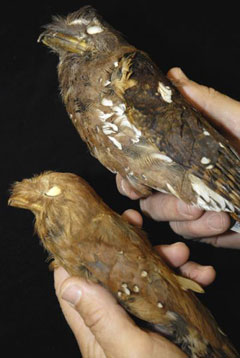New bird species discovered in the South Pacific
New bird species discovered in the South Pacific
mongabay.com
April 19, 2007
University of Florida scientists have discovered a new genus of frogmouth bird in the Solomon Islands. The findings are published in the April edition of Ibis: The International Journal of Avian Science.

A new genus of frogmouth bird is seen in the top right of this photograph taken April 18, 2007. It was found in the Solomon Islands by Florida Museum of Natural History ornithologists Andrew Kratter and David Steadman. New bird genera are rare discoveries — only one per year is typically announced globally. Steadman believes the newly named Solomon Islands Frogmouth bird (Rigidipenna inexpectata) may be closely related to a genus of frogmouth bird found in the Philippines, (Batrachostomus), shown in the lower left. |
“This discovery underscores that birds on remote Pacific islands are still poorly known, scientifically speaking,” said David Steadman, an orinthologist at the Florida Museum of Natural History and co-author of the study. “Without the help of local hunters, we probably would have overlooked the frogmouth.”
The bird was originally misclassified as a subspecies of the Australian Marbled Frogmouth, Podargus ocellatus, an error that was overlooked for decades until another specimen was collected on the island of Isabel in the Solomons.
The bird, thought to be a poor flier, feeds on insects and small animals.
The discovery of a new genus of bird is unusual–less than one new genus is discovered each year, according to Steadman, who is well known for his work on bird extinction across the South Pacific.
CITATION: NIGEL CLEERE, ANDREW W. KRATTER, DAVID W. STEADMAN, MICHAEL J. BRAUN, CHRISTOPHER J. HUDDLESTON, CHRISTOPHER E. FILARDI & GUY DUTSON (2007). A new genus of frogmouth (Podargidae) from the Solomon Islands — results from a taxonomic review of Podargus ocellatus inexpectatus Hartert 1901 Ibis, Volume 149, Issue 2: 271-286. doi: 10.1111/j.1474-919X.2006.00626.x.
This note is based on a news release from the University of Florida and materials from Ibis.







